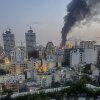
Israeli air defense systems fire to intercept Iranian missiles over Tel Aviv before dawn Wednesday. Israel and Iran exchanged fire for a sixth day. Menahem Kahana/AFP via Getty Images hide caption
toggle caption
Menahem Kahana/AFP via Getty Images
Israeli Prime Minister Benjamin Netanyahu has argued for decades that Iran was on the verge of producing a nuclear weapon. And he ordered the attack on Iran because he believed Tehran was “marching very quickly” toward a bomb.
“The intel we got and we shared with the United States was absolutely clear, was absolutely clear that they [the Iranians] were working, in a secret plan, to weaponize the uranium,” Netanyahu said in an interview with Fox News.
However, the U.S. intelligence community has long had a somewhat different interpretation. The Americans say Iran suspended its nuclear weapons program in 2003, shortly after the U.S. invaded Iraq. While Iraq did not have the weapons of mass destruction the U.S. claimed, the invasion of a neighboring country appeared to rattle Iran, believing it too could face a U.S. incursion.

Middle East crisis — explained
Iran warns of ‘irreparable consequences’ as Trump weighs U.S. role in conflict
Director of National Intelligence Tulsi Gabbard reiterated the U.S. position in testimony before the Senate Intelligence Committee on March 25.
“The (intelligence community) continues to assess that Iran is not building a nuclear weapon and Supreme Leader (Ayatollah Ali) Khamenei has not authorized the nuclear weapons program that he suspended in 2003,” Gabbard said.
However, President Trump has now contradicted Gabbard.
“I don’t care what she said. I think they (the Iranians) were very close to having it,” the president told reporters as he flew back to Washington from the G7 summit in Canada.
So what to make of these competing claims?
Israeli officials, and Netanyahu in particular, have always tended to see new developments in Iran’s nuclear program as movement toward a bomb that would directly threaten Israel.
U.S. national security officials have acknowledged over the years that Iran continues to work on many aspects of its nuclear program, but say Khamenei has always stopped short of authorizing the building of a nuclear weapon.
U.N. agency says uranium enrichment has increased
The U.N.’s nuclear watchdog, the International Atomic Energy Agency, says Iran has now accumulated a little over 400 kilograms (about 900 pounds) of Uranium-235 enriched to 60% purity.

World
4 things to know as the war between Israel and Iran intensifies
For comparison, uranium enriched to 5% can be used to run a civilian nuclear power plant, and 90% enrichment is considered weapons grade.
To go from 60% to 90% enrichment can be done quickly, according to nuclear experts.
If Iran did that, it would have enough material for about 10 nuclear weapons, according to U.S. and Israeli officials.
The Iranians would still need to take several additional steps such as turning the uranium in gas form to metal, and then fashioning it into a bomb design.
Prior to this attack, if Iran headed down this path, it could likely produce a rudimentary bomb in around six months, according to David Albright, the president of the Institute for Science and International Security, which closely monitors Iran’s nuclear program.
The chaos of the current conflict has scrambled many previous calculations. But experts say Israel has set back Iran’s program with attacks on multiple nuclear sites, including airstrikes that have killed at least nine Iranian nuclear scientists, according to the Israeli military.
“I think Israel is lengthening the time Iran would need to make nuclear weapons, probably significantly,” Albright said.

Inspectors from the International Atomic Energy Agency and Iranian technicians work at Iran’s Natanz nuclear facility about 200 miles south of Tehran in 2014. Israel has bombed the Natanz facility in recent days. IRNA/AFP via Getty Images hide caption
toggle caption
IRNA/AFP via Getty Images
Trump changes his tone
When Israel launched its airstrikes last Friday, the Trump administration was supportive of Israel, and the U.S. military has assisted with air defense systems to protect against Iranian missile strikes. But for the first few days, Trump and his team kept stressing that the U.S. was not involved in attacks against Iran.
Based on these public statements, it appeared that Trump initially gave Israel a “yellow light” to conduct the operation, agreeing to help Israel play defense, but not offense.
Now, with Israel inflicting heavy damage on Iran, Trump seems open to the possibility of direct U.S. military involvement.
Israel wants the U.S. to do something it can’t: unleash a huge, bunker-busting bomb to hit the most important Iranian nuclear facility, Fordow, which is built into the side of a mountain a little over 100 miles south of Tehran.
The U.S. bomb, known as the Massive Ordnance Penetrator, or the GBU-57, weighs 30,000 pounds and is so heavy that only one U.S. warplane is configured to carry it, the B-2 stealth bomber.
The U.S. provides Israel with a wide range of U.S. planes and U.S. bombs, which Israel is currently employing. But Israel doesn’t have this plane or this bomb. Israel has repeatedly made this request to the U.S., but it has always declined.
The Iranians chose the Fordow site with the knowledge that the U.S. or Israel might someday try to bomb it, as Israel has done with above-ground nuclear facilities in Iraq in 1981 and in Syria in 2007.
Fordow has “a considerable amount of 60% enriched uranium and a considerable number of gas centrifuges,” said Albright.
If the U.S. attacks, it’s not clear how much damage it could inflict on the Fordow site, which is believed to be close to 300 feet under the mountain.
“One [bomb] is not going to do it,” Albright said. “I think it’ll be a challenge with a couple. You try to hit the same spot more than once and the shockwave, you hope, will collapse the ceiling.”












